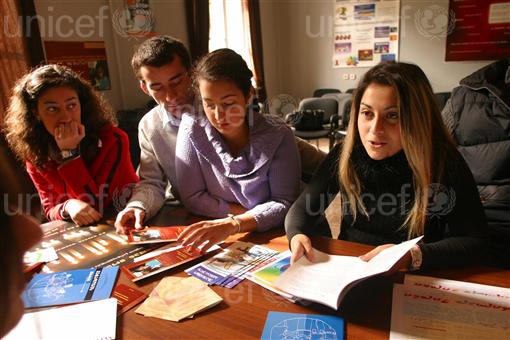
© UNICEF/NYHQ2004-1019/Pirozzi
��
Intergenerational relations have typically centered on sharing knowledge, cultural norms, traditions as well asreciprocal care, support and exchange of resources. Today, demographic transitions, changes in family structures and living arrangements along with migration trends are increasingly influencing relationships cross.
|
With rising longevity and declining fertility, the world is aging rapidly. By 2050, the number of people over 60 is projected to increase by 50 per cent in developed countries and triple in developing countries, with global life expectancy increasing to 75 years. While older adults may have more opportunities to share knowledge and resources with younger generations, they are also more likely to depend on the support of younger generations for longer periods of time.
Demographic changes and challenges to current social protection systems, especially pension schemes, may put the autonomous future of young people at risk. Furthermore, due to growing unemployment among youth, housing shortages or insufficient means to gain independence, young people may also be dependent longer on their parents.
Although still common in parts of the world, multigenerational families with intergenerational support and reliance are rapidly declining, especially in urban areas. Families are becoming smaller, and young people are postponing marriage, having fewer children and getting divorced. In rural settings, intergenerational patterns of socialization are often disrupted as youth migrate to cities, missing opportunities to benefit from the knowledge and guidance of older family members. Such trends pose new demands on family members and test the traditional grandparent-parent-youth relationships.
The United Nations and intergenerational partnership
In 2007 the General Assembly adopted a supplemement to the World Programme of Youth, which included Intergenerational Relations as a priority area. Its proposals for action focus on strengthening families, empowering young women and bolstering intergenerational solidarity.
The 2002 Madrid International Plan of Action on Aging notes that solidarity among generations is fundamental to an intergenerational society that values and demonstrates equity and reciprocity between generations. Several General Assembly resolutions encourage Member States to promote policies and programmes to reduce the vulnerability of younger and older generations through various social protection strategies.
A number of United Nations International Expert Group meetings proposed recommendations on intergenerational issues, including intergenerational solidarity. The 2009 meeting on “Family Policy in a Changing World: Promoting Social Protection and Intergenerational Solidarity” recommended partnerships and cooperation between youth and older persons organizations, community-based active ageing centres and research on intergenerational transfers to be used in national development plans.
Progress
There is a growing understanding of the importance of social integration and intergenerational solidarity, rooted in interdependence among generations during the lifecycle. The issues of intergenerational transmission of poverty and ways to prevent it by investing in children, youth and strong families have received more attention over the past years as well.
Conditional cash transfer for vulnerable families, implemented in many Latin American countries helped to reduce poverty, improve health and nutrition of children and reduce child labour.��
More research is underway on multigenerational living arrangements and intergenerational care provision and financial transfers. For instance, research based on the Survey of Health, Ageing and Retirement in Europe indicates high involvement of grandparents in child care in many European countries. Recent research in both developed and developing countries indicates that older people are more likely to financially support younger family members than to be on the receiving end. However, some research indicates that we may be witnessing a reversal in the direction of resource flows, due to the changing economic role of the elderly, closely tied to the rise of the welfare State, the growing importance of assets, and in part from the ageing population brought on by the demographic transition.
The way forward
Meaningful relationships based on mutual understanding between intergenerational family members are indispensable for social integration and cohesion. Thus, an intergenerational policy approach should gain more ground to create a society for all ages, ensuring that both young and old are involved in policy-making.
Governments, the private sector and civil society should promote opportunities for constructive interaction between young people and older generations by creating community programmes and promoting intergenerational communication at work.
Various social policies, like education and social protection provision for young and old, policies reconciling work and family life, and eliminating age-related barriers in the workplace may improve intergenerational relations at the family, community and societal level.
